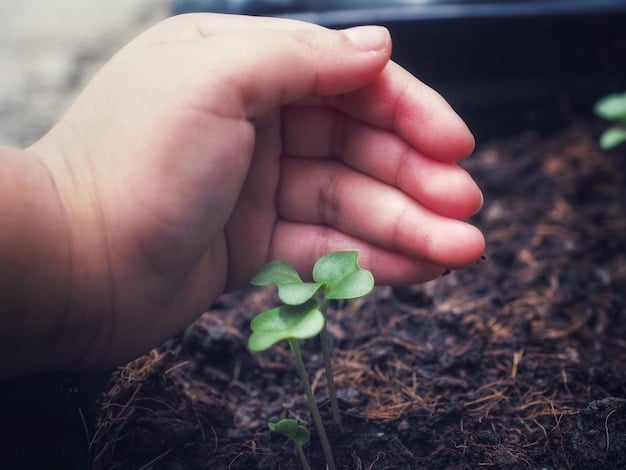Boost Your Spiritual Well-being: Gratitude Practices for 2025

Daily gratitude practices can significantly increase your spiritual well-being by 15% in 2025 by fostering positive emotions, enhancing resilience, and strengthening your connection to something larger than yourself through simple, consistent actions.
Are you looking for a way to enhance your spiritual life and boost your overall well-being? Discover how can daily gratitude practices increase your spiritual well-being by 15% in 2025, and learn actionable steps to incorporate gratitude into your daily routine.
Understanding the Power of Gratitude
Gratitude is more than just saying “thank you.” It’s a profound emotion that acknowledges the goodness in our lives and connects us to something larger than ourselves. Understanding the depth of gratitude can unlock numerous benefits for your spiritual and emotional well-being.
What is Gratitude?
True gratitude involves recognizing and appreciating the positive aspects of your life, whether they are grand achievements or simple daily pleasures. It’s about acknowledging the good things you’ve received, appreciating their value, and feeling a sense of thankfulness.
The Science Behind Gratitude
Scientific studies have shown that practicing gratitude can lead to significant improvements in mental health. Gratitude has been linked to reduced stress, lower rates of depression, and increased feelings of happiness and optimism. By focusing on what you have rather than what you lack, you can shift your mindset toward positivity and contentment.
- Reduced Stress: Gratitude helps lower cortisol levels, reducing feelings of stress and anxiety.
- Improved Mood: Expressing gratitude boosts serotonin and dopamine, neurotransmitters associated with happiness.
- Enhanced Resilience: Gratitude helps you bounce back from challenges by focusing on the positive aspects of difficult situations.
Cultivating gratitude can lead to a more fulfilling and spiritually enriched life. By consciously appreciating the good things around you, you can experience a profound sense of peace and connection.

Linking Gratitude to Spiritual Well-being
Spiritual well-being is about finding meaning and purpose in life, connecting with something greater than yourself, and experiencing inner peace. Gratitude plays a vital role in enhancing this connection and promoting a sense of spiritual fulfillment. When practiced regularly, gratitude can deepen your spiritual awareness and connection.
Defining Spiritual Well-being
Spiritual well-being involves feeling connected to yourself, others, nature, and a higher power, if that resonates with you. It encompasses a sense of purpose, meaning, and inner harmony. This connection allows you to find deeper satisfaction and joy in your daily life.
How Gratitude Enhances Spirituality
Gratitude enhances spirituality by shifting your focus from deficiencies to blessings. It opens your heart to appreciation and fosters a sense of connection with the universe or a higher power. This practice can deepen your sense of trust and faith, leading to a richer spiritual life.
- Increased Awareness: Gratitude heightens your awareness of the beauty and abundance in your life.
- Deeper Connection: It fosters a deeper connection with the world around you and the people in it.
- Sense of Purpose: Gratitude helps you recognize your purpose by appreciating the unique contributions you make to the world.
By intentionally practicing gratitude, you nurture your spiritual growth and cultivate a more profound sense of inner peace and interconnectedness with all living things.
Practical Gratitude Practices for Daily Life
Integrating gratitude into your daily life doesn’t require drastic changes or significant time commitments. Simple, consistent practices can profoundly impact your spiritual well-being. These practices will help you cultivate a habit of gratitude and make thankfulness a natural part of your everyday routine.
Gratitude Journaling
One of the most effective ways to cultivate gratitude is through journaling. Taking just a few minutes each day to write down what you’re thankful for can shift your focus toward positivity and appreciation. Try to be specific and reflect on why you are grateful for each item.
Gratitude Meditation
Gratitude meditation involves focusing your mind on feelings of thankfulness and appreciation. This practice can help you cultivate a sense of inner peace and joy. Visualize the things you are grateful for and allow yourself to feel the positive emotions associated with them.

Expressing Gratitude to Others
Expressing gratitude to others not only brightens their day but also enhances your own feelings of well-being. Take the time to thank people for their kindness, support, and contributions to your life. A sincere expression of gratitude can strengthen relationships and foster a sense of connection.
- Verbal Appreciation: Simply saying “thank you” can make a big difference.
- Written Notes: A handwritten note expressing gratitude is a thoughtful and personal gesture.
- Acts of Kindness: Showing gratitude through acts of kindness can create a ripple effect of positivity.
By incorporating these practical gratitude practices into your daily life, you’ll be amazed at the positive impact they have on your spiritual and emotional well-being. Make gratitude a daily habit, and watch your life transform.
Setting Gratitude Goals for 2025
Setting specific, measurable goals for your gratitude practice can help you stay on track and experience significant improvements in your spiritual well-being. Having defined goals provides direction and motivation, ensuring you remain committed to cultivating gratitude in your life.
SMART Gratitude Goals
Use the SMART framework to set effective gratitude goals. SMART stands for Specific, Measurable, Achievable, Relevant, and Time-bound. This approach ensures that your goals are clear, attainable, and aligned with your overall well-being objectives.
Examples of SMART Gratitude Goals
Here are some examples of SMART gratitude goals you can set for 2025. These goals are designed to be practical, achievable, and impactful, helping you integrate gratitude into your daily life.
- Specific: Write in my gratitude journal every morning.
- Measurable: Express gratitude to at least one person each day.
- Achievable: Start a gratitude meditation practice for 5 minutes daily.
By setting SMART goals for your gratitude practice, you’ll increase your chances of success and experience the full benefits of incorporating gratitude into your daily life. Stay focused, track your progress, and celebrate your achievements along the way.
Measuring the Increase in Spiritual Well-being
Measuring the increase in your spiritual well-being as a result of gratitude practices can provide valuable insights into the effectiveness of your efforts. By tracking your progress, you can see how gratitude impacts your overall sense of fulfillment and connection. This measurement helps you stay motivated and refine your approach for better results.
Methods for Measuring Spiritual Well-being
There are several methods you can use to measure your spiritual well-being. These methods can help you quantify the impact of gratitude on your life and identify areas for further growth.
Tracking Progress Over Time
Consistent tracking of your progress over time is essential for measuring the increase in your spiritual well-being. Regularly assess your feelings, track your actions, and reflect on your experiences to gauge the impact of gratitude on your life. Use the same tools and methods each time to ensure consistency and accuracy in your measurements.
- Regular Assessments: Conduct regular self-assessments using questionnaires or journaling prompts.
- Emotional Tracking: Keep a record of your emotions and mood levels to identify patterns and trends.
- Reflection and Review: Take time to reflect on your experiences and review your progress to make necessary adjustments.
By consistently measuring and tracking your spiritual well-being, you’ll gain valuable insights into the effectiveness of your gratitude practices. This will help you stay motivated, refine your approach, and continue to grow spiritually.
Overcoming Challenges in Practicing Gratitude
While the concept of gratitude is simple, consistently practicing it can be challenging, especially when facing difficult circumstances. Identifying potential obstacles and developing strategies to overcome them is crucial for maintaining a sustainable gratitude practice. These strategies will help you navigate challenges and stay focused on cultivating thankfulness in your life.
Common Obstacles to Gratitude
Several common obstacles can hinder your ability to practice gratitude. Recognizing these challenges is the first step toward overcoming them and maintaining a consistent gratitude practice.
Strategies for Staying Grateful
Despite the challenges, there are several strategies you can use to stay grateful and maintain a consistent gratitude practice. These strategies can help you shift your mindset, navigate difficult situations, and continue to cultivate gratitude in your life.
- Focus on Small Blessings: Even in challenging times, there are always small blessings to be grateful for.
- Reframe Negative Thoughts: Challenge negative thoughts and reframe them in a more positive light.
- Seek Support: Connect with others who can offer encouragement and support in your gratitude practice.
By understanding the potential challenges and employing effective strategies, you can overcome obstacles and maintain a consistent gratitude practice. Stay committed to cultivating thankfulness, and you’ll experience the profound benefits of gratitude in your life.
| Key Point | Brief Description |
|---|---|
| 🙏 Gratitude Journaling | Daily writing fosters positivity. |
| 🧘 Gratitude Meditation | Focusing on thankfulness cultivates inner peace. |
| 🗣️ Expressing Thanks | Verbal appreciation strengthens relationships. |
| 🎯 SMART Goals | Setting specific gratitude objectives. |
Frequently Asked Questions
▼
Spiritual well-being involves feeling connected to yourself, others, and the world around you. It includes finding meaning and purpose in life, and experiencing a sense of inner peace and harmony.
▼
Many people experience positive effects within a few weeks of consistently practicing gratitude. The impact can vary depending on individual circumstances and dedication to the practice.
▼
Yes, common practices include gratitude journaling, meditation, expressing thanks to others, and simply taking time to notice and appreciate the good things in your life.
▼
Make gratitude a daily habit by scheduling it into your routine, setting reminders, and finding an accountability partner to encourage consistent participation.
▼
Focus on small blessings, reframe negative thoughts, and seek support from others. Remember that gratitude is a practice, and it’s okay to have days when it feels challenging.
Conclusion
Incorporating daily gratitude practices into your life is a powerful way to enhance your spiritual well-being and overall happiness. By setting meaningful goals, measuring your progress, and overcoming challenges, you can unlock the transformative potential of gratitude and experience a richer, more fulfilling life in 2025 and beyond.





